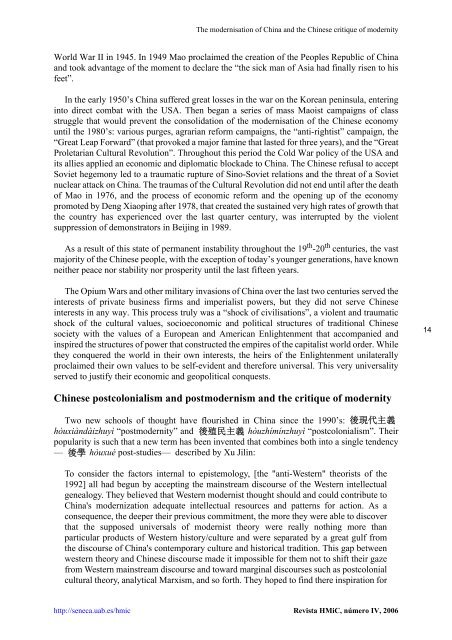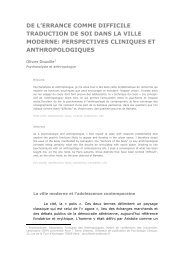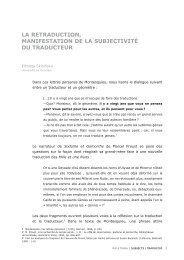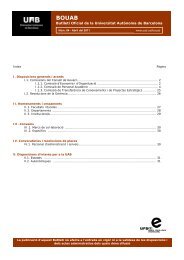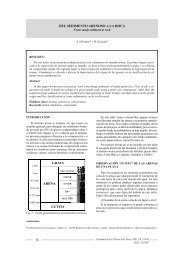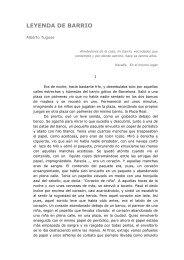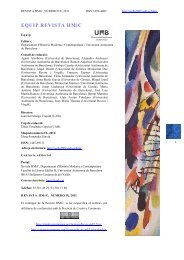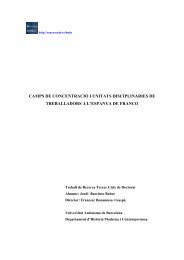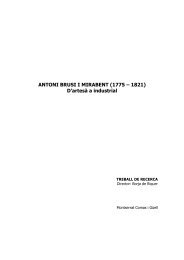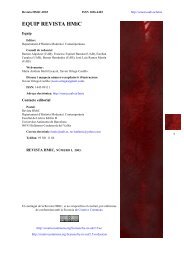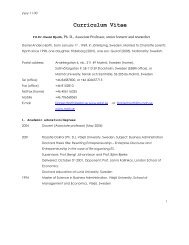EQUIP REVISTA HMiC - Universitat Autònoma de Barcelona
EQUIP REVISTA HMiC - Universitat Autònoma de Barcelona
EQUIP REVISTA HMiC - Universitat Autònoma de Barcelona
Create successful ePaper yourself
Turn your PDF publications into a flip-book with our unique Google optimized e-Paper software.
The mo<strong>de</strong>rnisation of China and the Chinese critique of mo<strong>de</strong>rnity<br />
World War II in 1945. In 1949 Mao proclaimed the creation of the Peoples Republic of China<br />
and took advantage of the moment to <strong>de</strong>clare the “the sick man of Asia had finally risen to his<br />
feet”.<br />
In the early 1950’s China suffered great losses in the war on the Korean peninsula, entering<br />
into direct combat with the USA. Then began a series of mass Maoist campaigns of class<br />
struggle that would prevent the consolidation of the mo<strong>de</strong>rnisation of the Chinese economy<br />
until the 1980’s: various purges, agrarian reform campaigns, the “anti-rightist” campaign, the<br />
“Great Leap Forward” (that provoked a major famine that lasted for three years), and the “Great<br />
Proletarian Cultural Revolution”. Throughout this period the Cold War policy of the USA and<br />
its allies applied an economic and diplomatic blocka<strong>de</strong> to China. The Chinese refusal to accept<br />
Soviet hegemony led to a traumatic rupture of Sino-Soviet relations and the threat of a Soviet<br />
nuclear attack on China. The traumas of the Cultural Revolution did not end until after the <strong>de</strong>ath<br />
of Mao in 1976, and the process of economic reform and the opening up of the economy<br />
promoted by Deng Xiaoping after 1978, that created the sustained very high rates of growth that<br />
the country has experienced over the last quarter century, was interrupted by the violent<br />
suppression of <strong>de</strong>monstrators in Beijing in 1989.<br />
As a result of this state of permanent instability throughout the 19 th -20 th centuries, the vast<br />
majority of the Chinese people, with the exception of today’s younger generations, have known<br />
neither peace nor stability nor prosperity until the last fifteen years.<br />
The Opium Wars and other military invasions of China over the last two centuries served the<br />
interests of private business firms and imperialist powers, but they did not serve Chinese<br />
interests in any way. This process truly was a “shock of civilisations”, a violent and traumatic<br />
shock of the cultural values, socioeconomic and political structures of traditional Chinese<br />
society with the values of a European and American Enlightenment that accompanied and<br />
inspired the structures of power that constructed the empires of the capitalist world or<strong>de</strong>r. While<br />
they conquered the world in their own interests, the heirs of the Enlightenment unilaterally<br />
proclaimed their own values to be self-evi<strong>de</strong>nt and therefore universal. This very universality<br />
served to justify their economic and geopolitical conquests.<br />
Chinese postcolonialism and postmo<strong>de</strong>rnism and the critique of mo<strong>de</strong>rnity<br />
Two new schools of thought have flourished in China since the 1990’s: 後現代主義<br />
hòuxiàndàizhuyì “postmo<strong>de</strong>rnity” and 後殖民主義 hòuzhímínzhuyì “postcolonialism”. Their<br />
popularity is such that a new term has been invented that combines both into a single ten<strong>de</strong>ncy<br />
— 後學<br />
hòuxué post-studies— <strong>de</strong>scribed by Xu Jilin:<br />
To consi<strong>de</strong>r the factors internal to epistemology, [the "anti-Western" theorists of the<br />
1992] all had begun by accepting the mainstream discourse of the Western intellectual<br />
genealogy. They believed that Western mo<strong>de</strong>rnist thought should and could contribute to<br />
China's mo<strong>de</strong>rnization a<strong>de</strong>quate intellectual resources and patterns for action. As a<br />
consequence, the <strong>de</strong>eper their previous commitment, the more they were able to discover<br />
that the supposed universals of mo<strong>de</strong>rnist theory were really nothing more than<br />
particular products of Western history/culture and were separated by a great gulf from<br />
the discourse of China's contemporary culture and historical tradition. This gap between<br />
western theory and Chinese discourse ma<strong>de</strong> it impossible for them not to shift their gaze<br />
from Western mainstream discourse and toward marginal discourses such as postcolonial<br />
cultural theory, analytical Marxism, and so forth. They hoped to find there inspiration for<br />
http://seneca.uab.es/hmic Revista <strong>HMiC</strong>, número IV, 2006<br />
14


